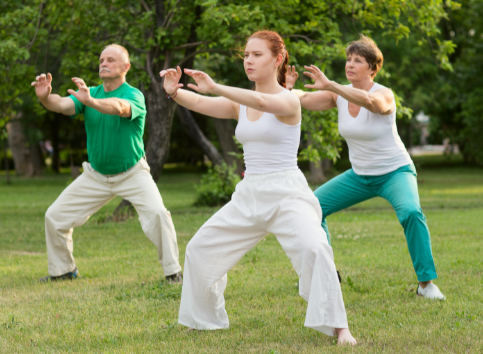Tai chi: How can it help chronic illness patients?
Published Aug 16, 2024 • By Somya Pokharna
In recent years, tai chi has garnered increasing attention as a holistic approach to health and wellness. Originating from ancient China, this mind-body practice combines slow, deliberate movements with deep breathing and meditation. Often described as “meditation in motion,” tai chi is not only a form of martial art, but also a means to improve physical and mental health.
But what exactly is the practice of tai chi? How can it help someone living with a chronic illness?
Take a slow, deep breath and wade into this article to find out!

What is tai chi?
Tai chi, also known as tai chi chuan, is a centuries-old practice rooted in Chinese martial arts and philosophy. It involves a series of gentle, flowing movements performed in a slow, focused manner, accompanied by deep breathing. The movements are designed to promote relaxation, balance, and flexibility.
Unlike other forms of exercise, tai chi is low-impact and can be easily adapted to suit individuals of all ages and fitness levels, making it particularly suitable for people with chronic health conditions.
How can tai chi benefit your body physically?
Improved balance and reduced fall risk
For patients with chronic illnesses, maintaining balance and preventing falls are critical. Tai chi has been shown to improve proprioception, the body’s ability to sense its position in space, which enhances balance and coordination. Studies indicate that regular practice of tai chi can significantly reduce the risk of falls in older adults and those with conditions such as Parkinson's disease or multiple sclerosis.
Enhanced flexibility and strength
Tai chi’s slow, deliberate movements help to gently stretch muscles and joints, improving overall flexibility. Additionally, the practice involves weight-bearing movements that can strengthen muscles, particularly in the lower body. This combination of flexibility and strength training is beneficial for individuals with arthritis, fibromyalgia, and other musculoskeletal disorders.
Cardiovascular health
While tai chi is low-impact, it still provides a moderate aerobic workout. Research has shown that regular practice can help to lower blood pressure, improve circulation, and enhance overall cardiovascular health. This makes tai chi a valuable exercise option for patients with heart disease or those at risk of cardiovascular problems.
What are the mental health benefits of tai chi?
Stress reduction and emotional well-being
Tai chi’s meditative aspects, including controlled breathing and focused movements, promote relaxation and stress reduction. This practice helps to lower levels of cortisol, the body’s primary stress hormone. As a result, individuals practicing tai chi often experience reduced anxiety, improved mood, and better overall emotional well-being.
Cognitive function
Emerging research suggests that tai chi can enhance cognitive function, particularly in older adults. The practice requires mental concentration and coordination, which can help to improve memory, attention, and overall cognitive performance. This is particularly beneficial for patients with conditions such as dementia or mild cognitive impairment.
Which chronic conditions can tai chi be helpful for?
For individuals with arthritis, tai chi offers a gentle way to keep joints moving and improve flexibility without exacerbating pain. Studies have shown that regular tai chi practice can reduce pain, stiffness, and improve physical function in people with osteoarthritis and rheumatoid arthritis.
Fibromyalgia is characterized by widespread pain, fatigue, and cognitive difficulties. Tai chi’s gentle, flowing movements and emphasis on relaxation can help to alleviate some of these symptoms. Research indicates that tai chi can reduce pain and improve sleep quality and physical function in individuals with fibromyalgia.
Tai chi may also benefit individuals with diabetes by improving blood glucose levels and enhancing overall metabolic health. The combination of physical activity, stress reduction, and improved cardiovascular health can contribute to better management of diabetes and its complications.
What should you consider before starting tai chi?
One of the significant advantages of tai chi is its accessibility. It can be practiced virtually anywhere, requires no special equipment, and can be easily adapted to suit individual needs. Whether practiced standing, seated, or even lying down, tai chi can be modified to accommodate different levels of mobility and physical ability.
For beginners, it is recommended to start with a qualified instructor who can guide proper technique and ensure safety. Many communities offer tai chi classes through local health clubs, senior centers, and community organizations. There are also numerous online resources and instructional videos available for those who prefer to practice at home.
Key Takeaways
Tai chi offers a multitude of health benefits for patients with chronic illnesses, from improved physical balance and strength to enhanced mental well-being and cognitive function. Its gentle, adaptable nature makes it an ideal exercise option for individuals of all ages and fitness levels. By incorporating tai chi into their regular routine, patients with chronic conditions can experience a better quality of life and improved overall health. As always, it is advisable to consult with a healthcare provider before beginning any new exercise regimen.
Did you find this article helpful?
Give it a “Like” and share your thoughts and questions with the community in the comments below!
Take care!
Sources:
Solloway, M. R., Taylor, S. L., Shekelle, P. G., Miake-Lye, I. M., Beroes, J. M., Shanman, R. M., & Hempel, S. (2016). An evidence map of the effect of Tai Chi on health outcomes. Systematic reviews, 5(1), 126.
Yang, G. Y., Hunter, J., Bu, F. L., Hao, W. L., Zhang, H., Wayne, P. M., & Liu, J. P. (2022). Determining the safety and effectiveness of Tai Chi: a critical overview of 210 systematic reviews of controlled clinical trials. Systematic reviews, 11(1), 260.
Yang, G. Y., Wang, L. Q., Ren, J., Zhang, Y., Li, M. L., Zhu, Y. T., Luo, J., Cheng, Y. J., Li, W. Y., Wayne, P. M., & Liu, J. P. (2015). Evidence base of clinical studies on Tai Chi: a bibliometric analysis. PloS one, 10(3), e0120655.
Tai Chi: What You Need To Know — National Center for Complementary and Integrative Health (NCCIH)
The Health Benefits of Tai Chi — Harvard Health
Sparks, D. (2018, October 3). Mayo Mindfulness: Tai chi is a gentle way to fight stress - Mayo Clinic News Network. Mayo Clinic News Network.
Wang, D., Wang, P., Lan, K., Zhang, Y., & Pan, Y. (2020). Effectiveness of Tai chi exercise on overall quality of life and its physical and psychological components among older adults: a systematic review and meta-analysis. Brazilian journal of medical and biological research = Revista brasileira de pesquisas medicas e biologicas, 53(10), e10196.
Hui, J., Wang, Y., Zhao, J., Cong, W., & Xu, F. (2022). Effects of Tai Chi on health status in adults with chronic heart failure: A systematic review and meta-analysis. Frontiers in cardiovascular medicine, 9, 953657.
Tai chi and qigong for Parkinson's — Parkinson's UK
Chao, M., Wang, C., Dong, X., & Ding, M. (2018). The Effects of Tai Chi on Type 2 Diabetes Mellitus: A Meta-Analysis. Journal of diabetes research, 2018, 7350567.
1 comment
You will also like

What are the dangers associated with the over-the-counter sale of certain medicines?
Dec 19, 2020 • 6 comments

 Facebook
Facebook Twitter
Twitter


